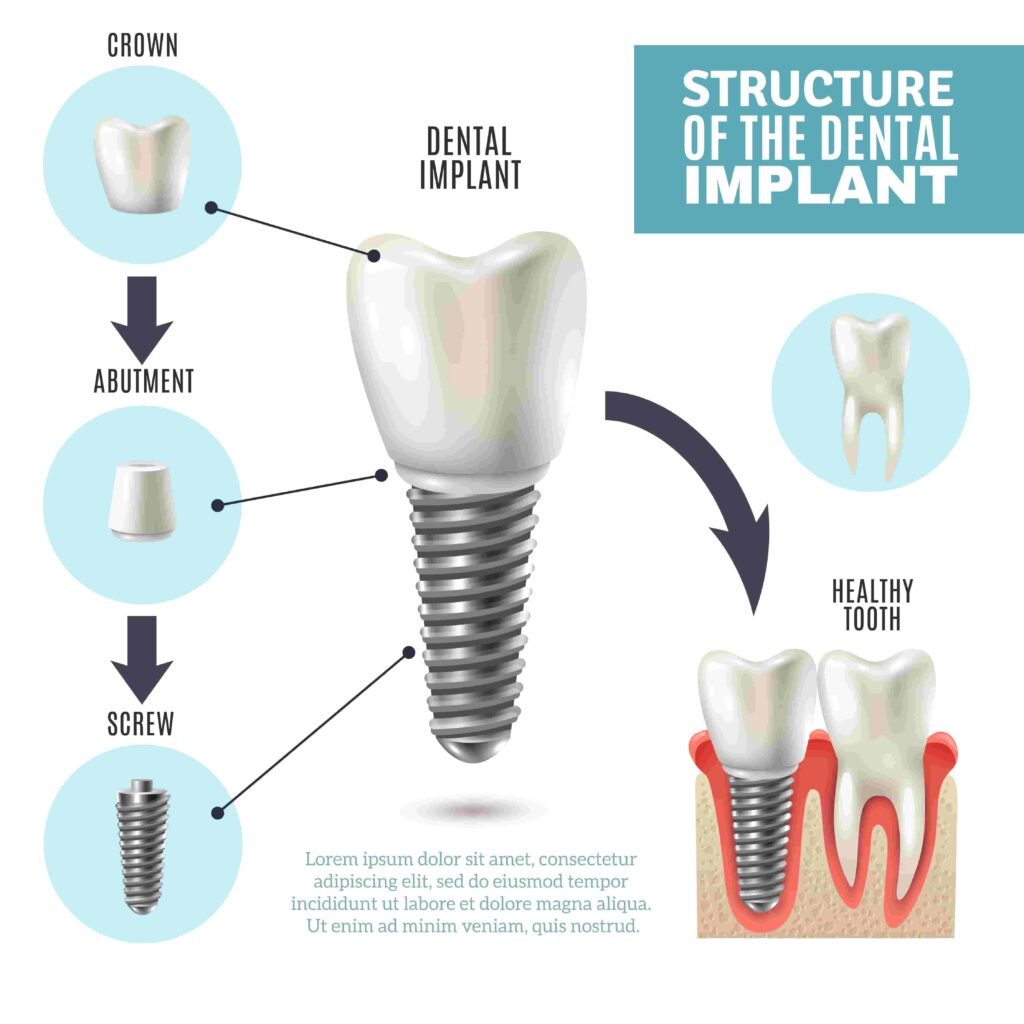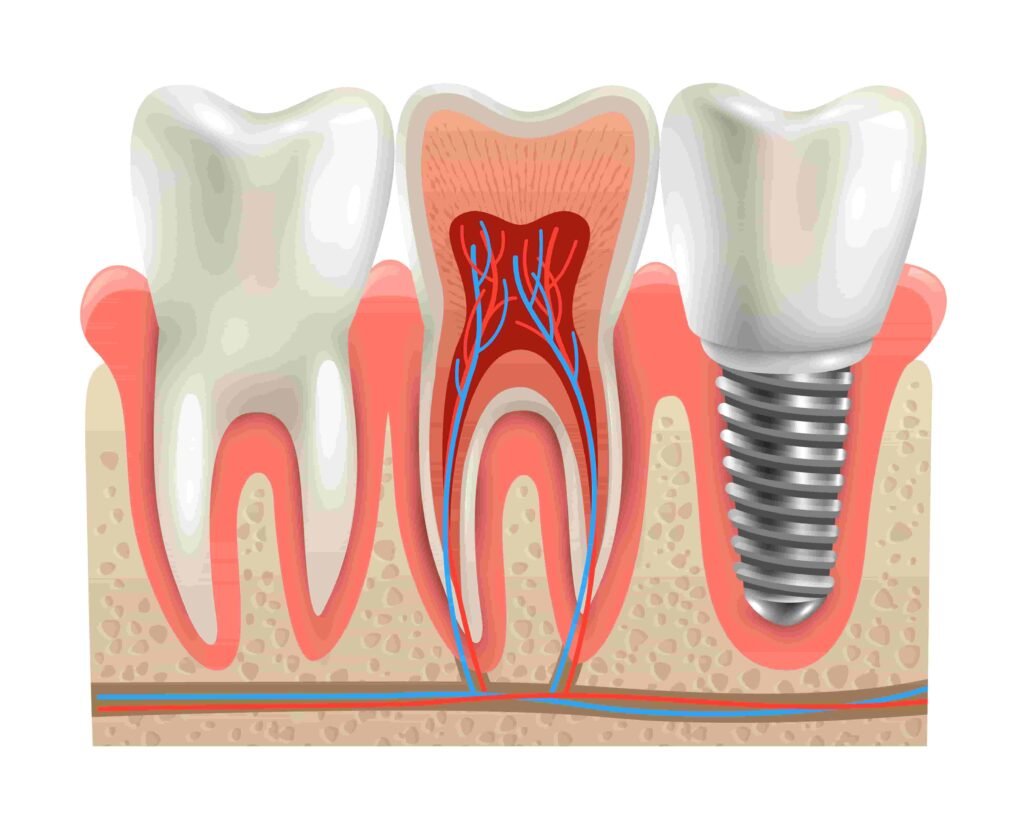Dental implants are rapidly becoming the treatment of choice for people who are looking to replace teeth that have been lost or damaged. They provide a long-term, permanent solution to the issue, offering a natural appearance, a comfortable fit, and the potential to last a lifetime.
On the other hand, there are a lot of myths surrounding dental implants, which could make you question whether getting them is the best option for you. It is essential that you have an accurate understanding of dental implants, including both their positive and negative aspects, before arriving at a conclusion regarding whether or not they are the most suitable choice for you.
The purpose of this article is to provide you with information about dental implants so that you can make an educated decision about whether or not getting them is something you should do.
What Are Dental Implants?

Dental implants are replacement tooth roots that are artificial and are surgically placed into the jawbone to replace missing teeth. Crowns, bridges, and dentures are all examples of dental prosthetics that can be supported by these implants. The implants help to provide artificial teeth with greater stability and strength, which contributes to the preservation of their shape and structure.
Dental implants are typically made of titanium and resemble miniature screws on the outside. When the bone fuses to the implant, a process known as osseointegration occurs. This creates a strong and stable foundation for the artificial teeth to be placed on.
Dental implants can be used to replace:
- Single Tooth
- Multiple teeth
- Even all of the natural teeth in the mouth
They are used to improve the aesthetics of the smile, as well as provide additional comfort and convenience for individuals who have difficulty using traditional dentures. They are also used to help people who are missing teeth.
Dental implants are the closest you can get to natural teeth. They are designed to look and feel just like your natural teeth, and they offer a secure fit. If properly cared for and maintained, they have the potential to last a lifetime.
People who have dental implants typically experience an increase in their sense of self-confidence because they no longer need to worry about missing teeth or dentures that do not fit properly. This frees them up to focus on other aspects of their appearance and improves their overall quality of life.
At City Dental Hospital, we are committed to providing you with the Best dental implant Treatment in India of the highest standard. Our dentists will conduct an examination of your mouth to determine whether or not you are a suitable candidate for dental implants.
We are aware that getting dental implants can be a significant financial commitment; consequently, we make every effort to ensure that the procedure is as cost-effective and stress-free as is humanly possible.
City Dental Hospital’s highly trained dentists can answer any questions you may have about getting dental implants. To help you decide if dental implants are the right choice for you, we have compiled all the information you’ll need. Get in touch with us right away if you want to find out the facts about dental implants and find out if they are right for you.
Are Dental Implants For Me? Reasons not to get dental implants
Are dental implants for me? This is a question that is frequently asked by people who are in need of dental treatment. At City Dental Hospital, we are aware of how important it is to guide you in the direction of the choice that is best for your oral health.
Dental implants are a great option for people who are:
- Looking to replace missing teeth
- Restore the appearance of their smile
- Improve the health of their mouth as a whole
Dental implants are intended to be a long-term replacement for natural teeth in patients who are missing some or all of their teeth. The root of a tooth that is missing can be replaced with an implant, which is a post made of titanium that is surgically inserted into the jawbone.
After that, a crown is placed on top of the implant to recreate the appearance and functionality of a natural tooth. Dental implants are an excellent option for patients who want to improve their oral health as well as the appearance of their smile.
However, dental implants are not appropriate for everyone in need of replacement teeth. People who suffer from certain diseases or conditions, such as:
- Diabetes
- Heart disease
- Problems with the immune system
are probably not the best candidates for dental implants.
In addition, people who do not have enough bone in their jaws or who do not practice good oral hygiene may not be good candidates for dental implants.
At City Dental Hospital, we will conduct an in-depth consultation with you to determine whether or not dental implants are the solution that best meets your needs. Our team of highly trained dentists will design a treatment plan for you that is individualized to meet your specific requirements and objectives.
In addition to this, we will perform a thorough assessment to determine whether or not dental implants are the right treatment option for you.
Dental implants, in the long run, can be an excellent way to improve both your oral health and the appearance of your smile. However, it is critical to have a conversation with a trained dentist in order to determine whether or not dental implants are a good option for you. At City Dental Hospital, we recognize the significance of assisting you in making educated decisions regarding your oral health and are committed to doing so.

Pros & Cons of Dental Implants
Pros of Dental Implants
- Dental implants can look and feel like natural teeth
- Dental implants do not require the removal of other teeth
- Dental implants can last a lifetime with proper care
- Dental implants can help restore chewing, speech, and biting abilities
Cons of Dental Implants
- Dental implants require some surgical procedures
- Dental implants can be expensive
- Dental implants may require several visits to the dentist
- Dental implants may not be suitable for everyone
Who Is Not Suitable For Dental Implants?
Even though dental implants are a fantastic option for replacing missing teeth, they are not suitable for everyone. Individuals who, in general, do not qualify for dental implants include those who have the following conditions:
Have An Unhealthy Jawbone: In order to successfully implant dental implants, the jawbone where the implants will be placed needs to be robust and in good health. If the jawbone is unhealthy or weak, it will decrease the chances of the implants being successful.
Have Gum Disease Or An Infection: Failure of an implant can be caused by gum disease or an infection in the area surrounding the site of the implant. Because of this, people who have gum disease or an infection in the area where the implant will be placed might not be suitable for dental implants.
Are Smokers: Patients who smoke cigarettes are more likely to experience implant failure, making them not suitable for dental implant surgery.
Have Certain Medical Conditions: The success of dental implants can be negatively impacted by a number of different medical conditions. People who have diabetes or who take immunosuppressants, for instance, might not be good candidates for dental implants.
Pregnant Women: Hormonal shifts are a common side effect of pregnancy, and they have been shown to have an impact on the success rate of dental implants. As a result, women who are pregnant are typically not good candidates for dental implants.
Uncontrolled Systemic Diseases: Dental implants are not an option for people who have systemic diseases that are not under control, such as diabetes that is not under control or kidney failure. This is due to the fact that systemic diseases that are not under control can result in a weakened immune system, which in turn increases the risk of infection in the mouth and the areas surrounding it. A failed implant may result from this.
Weakened Immune System: Dental implants are not appropriate for people who have a weakened immune system. A compromised immune system can make a person more susceptible to developing an infection at the site of the implant, which can ultimately result in the failure of the implant.
Consumption Of Nicotine Or Alcohol: People who have a high nicotine or alcohol intake should not get dental implants because they are not good candidates for the procedure. This is due to the fact that nicotine and alcohol both have the potential to lessen the amount of blood that flows to the gums, which in turn can lessen the amount of oxygen that reaches the implant site. This can make the risk of infection higher, which in turn can lead to the implant not working properly.
What Is The Failure Rate Of Dental Implants?

The success rate of dental implants is determined by a number of different factors, including the kind of implant used, the method used to place the implant, and the patient’s overall oral health.
However, some studies have shown that the failure rate for dental implants can be as high as 20%. In general, the failure rate for dental implants is somewhere between 5 and 10%.
Are dental implants bad for your health? Dental implants are typically regarded as both safe and effective treatment options. In fact, they are frequently considered to be a more desirable substitute for dentures or bridges.
However, similar to other dental procedures, getting dental implants carries with it the possibility of complications such as:
- Infection
- Pain
- Damage to the nerves
Therefore, before moving forward with any procedure, it is essential to have a conversation with your dentist about the potential benefits as well as the risks associated with the procedure.
The worst part of a dental implant is the amount of time and money that is required. Because getting dental implants can be both expensive and time-consuming, it is essential to carefully consider the potential downsides and upsides of the procedure before committing to getting them.
Reasons not to get dental implants to include cost, the need for multiple visits to the dentist, potential risks associated with the procedure, and the fact that a dental implant cannot be removed once it has been placed.
In addition, the concept of having a foreign object placed inside their mouth may make some individuals feel uneasy. It is essential to have a conversation about your concerns with your dentist, who will be able to advise you on whether or not getting dental implants is the best choice for you.
Are There Any Long-Term Problems With Dental Implants?
Yes, there is a possibility that dental implants will cause complications in the long run. The majority of the risks that are associated with implants are only temporary, and they can be mitigated by ensuring that they are properly cared for and maintained.
On the other hand, there is the possibility of complications developing in the longer term, such as:
- Inflammation of the gum tissue surrounding the implant
- Infection
- The implant itself failed
If the implant is not positioned correctly during placement, it has the potential to cause significant harm to the teeth and tissues that are in the surrounding area.
In addition, just as is the case with any other type of prosthetic device, there is always the possibility of complications arising from the body’s reaction to the foreign material.
Dental implants, in general, are extremely dependable and have a success rate that is higher than 95%. It’s important to take care of and maintain implants properly to make sure they work well and last a long time.
In order to keep the implant in good health, it is recommended that you get checkups and cleanings on a regular basis.
In addition, maintaining a healthy oral hygiene routine includes the following:
- Brushing your teeth
- Flossing at least once per day
is necessary for the implant’s continued good health.
Dental implants are often necessary for patients who are missing one or more teeth. Restorative dental work, such as crowns and bridges, can benefit from having implants placed because they can serve as a solid foundation. Implants can also be used to secure dentures, in addition to providing a sturdy and natural-looking replacement for a tooth that has been lost.
In some instances, implants can even be utilized to provide the necessary support for a patient undergoing orthodontic treatment. Therefore, dental implants are frequently an essential and advantageous form of treatment for patients who require the replacement of one or more missing teeth.
It is essential for patients to schedule routine checkups at the City Dental Hospital on a consistent basis in order to lessen the likelihood of developing complications in the long run.
Checkups at regular intervals can assist in the detection of any potential problems and
will serve to ensure that the implant is operating as intended. In order to maintain healthy gums and teeth, it’s crucial to maintain a regular oral hygiene routine that includes both brushing and flossing.
Dental implants are generally a safe and reliable option for replacing teeth that have been lost, but there are some long-term complications that can arise. Regular checkups at City Dental Hospital and good oral hygiene are the best ways to avoid any serious issues down the road. However, dental implants aren’t the best solution for everyone, so it’s smart to talk to a dentist about your options before making a final call.
Are Dental Implants Right For Me?
You should talk to your dentist about whether or not a dental implant is right for you. People who are missing teeth and are looking for a solution that both looks and feels natural may find that dental implants are a good option for them.
When cared for properly, dental implants are not only permanent but also very secure and can last for a very long time. If you are interested in replacing a missing tooth with something that will last for the rest of your life, then a dental implant might be the best option for you.
When determining whether or not a dental implant is the best solution for you, there are a number of considerations to take into account. Your dentist will probably consider the overall health of your teeth, as well as your financial situation and the way you live your life when making treatment recommendations.
For those who have good oral health and sufficient financial resources, for instance, getting implants may be the best option for replacing missing teeth. On the other hand, if you have poor oral health or a limited budget, then you might be better off considering one of the other available options.
Your dentist should also be able to provide additional information regarding the potential drawbacks and advantages of getting a dental implant. Even though getting dental implants is typically a risk-free and successful procedure, there is still the possibility of infection as well as other complications. Therefore, before making a choice, it is essential to have a conversation with your dentist about the various treatment options that are available to you.
At City Dental Hospital, our dentists will provide you with an in-depth consultation to assist you in determining whether or not dental implants are the most appropriate course of treatment for your specific needs.
Dental implants offer a safe and natural-looking alternative to traditional dentures or bridges for replacing missing teeth. The implant has the potential to last for a number of years, provided that it is properly maintained and examined on a routine basis.
At City Dental Hospital, our team of knowledgeable dentists is able to guide you through the process of evaluating the various treatment options and deciding on the most appropriate one for your situation. We value your oral health and aesthetic satisfaction, so we will do everything in our power to help you achieve a radiant grin.
Are There Alternatives To Dental Implants?

Yes, there are alternatives to dental implants. Dental bridges, dentures, and dental crowns are all possible alternatives for restoring missing teeth.
Dental Bridges: Dental bridges are prosthetic devices used to replace one or more missing teeth. A bridge is typically composed of two or more crowns that are bonded to the adjacent teeth. The false tooth or teeth, known as pontics, are then positioned between the crowns and function as a bridge to replace the missing tooth or teeth. Dental bridges can be fabricated from a variety of materials, such as porcelain and gold.
Dentures: Dentures are removable dental prostheses designed to replace missing teeth. They are typically made of acrylic and can be customized to fit the patient’s mouth shape and size. Depending on the patient’s requirements, dentures can be secured with adhesive, clips, or other attachments.
Dental Crowns: Crowns are used to cap and protect a tooth that has been damaged, decayed, or weakened. They are made of porcelain, gold, or other materials and can restore the tooth’s shape, strength, and appearance. A dental crown can sometimes be used to replace one or more missing teeth.
Regardless of the option chosen, it is essential to consult a dentist about the best option for each individual case. The dentist can evaluate the oral health of the patient and recommend the optimal method for replacing missing teeth.
City Dental Hospital can provide detailed information about the risks and benefits of
each of the treatments mentioned to anyone who is considering undergoing one of them.
The experienced dentists at City Dental Hospital can offer guidance on the best course of action and a variety of alternatives to dental implants. Ultimately, dental implants can be a good idea for some people, but it is important to consider all of the factors prior to making a final decision.
Transform Your Smile with Dental Implants
For those who want their natural teeth back, City Dental Hospital recommends dental implants. Dental implants are a great long-term oral health investment as they blend in with your natural teeth and fit securely. Dental implants can improve your oral health and quality of life, whether you need one or more teeth replaced.
However, dental implants are not for everyone. That’s why a dentist consultation is essential to determining if this option is right for you. In this consultation, your dentist will assess your situation and discuss dental implant benefits, risks, and alternatives. Thus, you can make an informed oral health choice.
To keep your teeth healthy, visit your dentist regularly, regardless of whether you get dental implants. For optimal oral health, we recommend an annual dental implant check-up and other oral health screening and maintenance.















